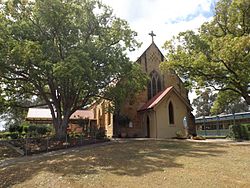St Francis Xavier Church, Goodna
| St Francis Xavier Church, Goodna | |
|---|---|

Building in 2015
|
|
| Location | 6 Church Street, Goodna, City of Ipswich, Queensland, Australia |
| Coordinates | 27°36′38″S 152°53′58″E / 27.6106°S 152.8995°ECoordinates: 27°36′38″S 152°53′58″E / 27.6106°S 152.8995°E |
| Design period | 1870s - 1890s (late 19th century) |
| Built | 1881 - 1980s |
| Architect | Andrea Giovanni Stombuco |
| Architectural style(s) | Gothic |
| Official name: St Francis Xavier Church, St Patrick's Church | |
| Type | state heritage (built) |
| Designated | 21 October 1992 |
| Reference no. | 600553 |
| Significant period | 1881, 1915, 1980s (fabric) |
| Significant components | memorial - plaque, memorial - statue, stained glass window/s, memorial - window, gate - entrance, trees/plantings |
| Builders | William Hanley |
St Francis Xavier Church is a heritage-listed Roman Catholic church at 6 Church Street, Goodna, City of Ipswich, Queensland, Australia. It was designed by Andrea Giovanni Stombuco and built in 1881 by William Hanley. It was originally known as St Patrick's Church. It was added to the Queensland Heritage Register on 21 October 1992.
St Francis Xavier Church was designed by architect Andrea Stombuco. The foundation stone for St Patricks's (as it was originally called) was laid on Sunday 15 August 1880 by Bishop of Brisbane James Quinn. The church was opened in Sunday 1 May 1881 by Bishop Quinn. Two major series of extensions and renovations have been made, the first by architects R. Coutts and Sons in 1915 and the second by Hubert van Hoof in the 1980s.
Construction of the church is well-documented. Local stone came from a nearby quarry, believed to be in Stuart Street; parishioners carted the stone to the site as voluntary work. Most masonry work was carried out by William Hanley but was finished by day labour. Carpentry and painting were carried out by James Madden of Ipswich. The cedar was from Doorey's sawmill at Mount Mistake, and other timber from Reillys and Hancocks of Ipswich. The original front cedar door was painted red and the interior was entirely plastered, except for the ceiling which was lined with "Rosewood pine" painted dark blue. The original roof was Gospel Oak iron.
The church was a substantial one; apart from St Mary's in Ipswich, other Catholic churches built in the Ipswich region at that time were simpler buildings of timber.
The church was originally part of Ipswich parish but became a separate parish in 1892, the first priest being Fr Thomas Hayes. A school was started in 1910 and a convent was built in 1911 for Sisters of Mercy who taught at the school. The convent, a two-storey timber building, is still standing in Church Street opposite St Francis Xavier Church. A timber presbytery was built in the 1890s but demolished c. 1980; its position is marked by a flat area encircled by trees immediately to the west of the current brick presbytery.
...
Wikipedia


